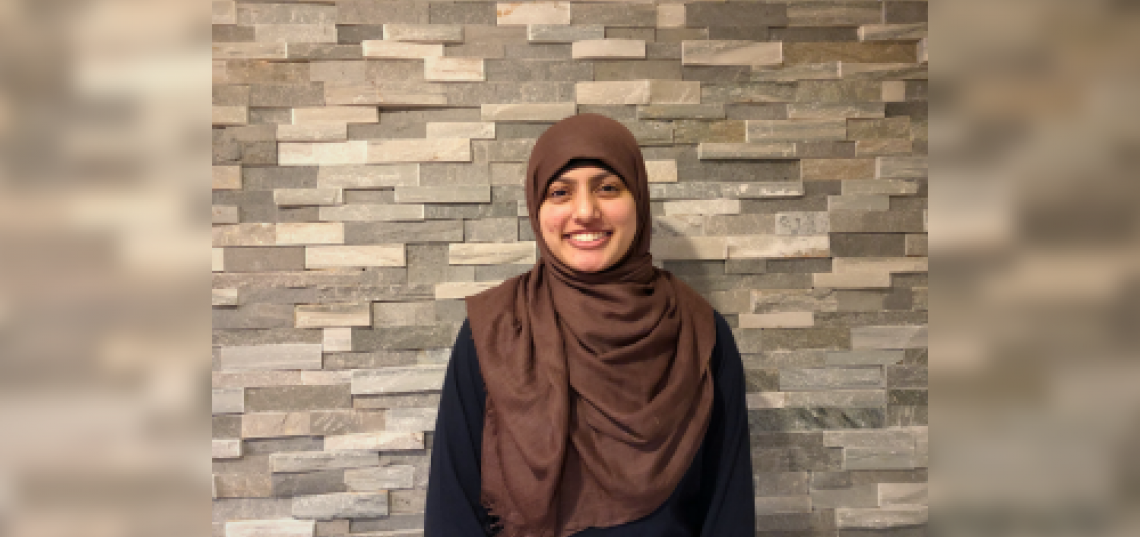
Maheem Hasan is a SC&I junior who is double-majoring in Information Technology and Informatics (ITI) and Cognitive Science while minoring in Psychology. Making the most of her time on campus, Maheem interns with the Rutgers Office of IT Accessibility (OITA), works for RU-Info, and belongs to several campus organizations, including Muslim Student Association (MSA) and Women in Information Technology and Informatics (Women in ITI).
SC&I: You have a full course load. Tell us about your fields of study and how they interact.
MH: At first, ITI and Cognitive Science were simply two fields that I was interested in that I believed were unrelated to each other. I enjoy the dynamic nature of the user and system relationship that the ITI program emphasizes. Cognitive Science combines several disciplines I am interested in, including psychology, neuroscience, decision-making, and linguistics. After taking more classes in both majors, I realized that there is a significant overlap between them. Human-computer interaction is an essential aspect of Cognitive Science and can be considered the prime focus of Information Technology and Informatics, depending on which concentration one decides to pursue. My Psychology minor has also allowed me to further explore the human facet. In this way, all three of my fields of study are correlative, and I frequently find myself applying knowledge gained in one subject matter to the other two.
SC&I: What ITI class has been most significant to you?
MH: Topics in IT: Web Accessibility has had the greatest impact on me. I was unaware of so many aspects of accessibility before taking this course, which is why I highly recommend it to all students majoring in ITI, especially to students interested in web design. Instructor Preston Radtke teaches this course, and he is currently one of my internship mentors at the Rutgers Office of IT Accessibility (OITA). This class taught me the fundamentals of accessibility, specifically accessibility in digital spaces, and how persons with disabilities interact with the web. I learned that it is the developers’ responsibility to enhance user experience and know what guidelines to follow. Overall, the ITI coursework has improved my technical skills in foundational coding knowledge and my interpersonal skills, including teamwork and adaptability. I look forward to exploring a few more classes in this major.
SC&I: Tell us about your OITA internship and serving as a mentor for RU-Info.
MH: My internship at OITA came about as a direct result of my taking Web Accessibility. After completing the course, I wanted to apply and expand my knowledge about accessibility. When Preston Radtke reached out to former students about the possibility of a position at the OITA office, I was eager to apply. As an intern, my responsibilities include completing web accessibility training courses and attending meet-ups with various IT professionals who discuss barriers and improvements. I also work closely with the IT accessibility analysts at the OITA office on different projects that will improve technical spaces at Rutgers. Through one of these projects, I assist with scanning websites for potential navigation difficulties for persons with disabilities.
As for my on-campus job, RU-Info is the general information line for Rutgers University. We get hundreds of calls a day from people who have questions about Rutgers, ranging from inquiries about term bills to requesting transcripts; however, we mostly handle questions from prospective undergraduate students. I received an interview for this position early last year via a referral from a student supervisor. As a mentor, I also guide new employees through a 25-hour training program focused on calling etiquette and how to quickly find information that someone is seeking.
SC&I: You belong to several groups, including Muslim Student Association and Women in ITI. What advice can you share about getting involved in campus life?
MH: My advice for current students is to put yourself out there and apply for leadership positions within clubs even if you don’t feel qualified. It’s better to make an attempt and fail than never to have tried in the first place. I would also advise that you get involved in clubs that will help you make friends along with clubs that are more focused on academics and careers. At Muslim Student Association, I know that I can attend informative and interesting events about Islam, fundraisers, or game nights and see my friends every week. It is something I look forward to amid assignments, classes, and exams. I turn to Women in ITI for career advice as well as academic and professional mentorship. This balance fulfills and enriches my campus life both socially and academically.
SC&I: What are your senior year and post-graduation plans?
MH: I intend to spend my senior year exploring more aspects of IT and finding my niche within this broad and complex field. While I am unsure about where I will work or what IT position will be the right fit for me after I graduate, I hope to find a fulfilling environment where I can apply the skills I have learned through my education and work experience.
Photo: Courtesy of Maheem Hasan
